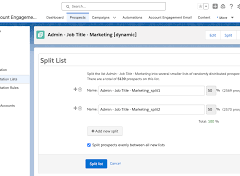Today, a stellar customer experience in financial services hinges on being digital-first, as affirmed by over three-quarters of Americans. This preference presents a significant opportunity for innovative, online-only fintech companies. However, for traditional financial services institutions (FSIs), it poses a crucial call to action to enhance their digital offerings promptly. Intelligent Customer Service in Financial Service.
The dilemma lies in achieving ambitious targets for cost savings, efficiency, and productivity while upholding the convenience and personalized attention that customers and clients expect from you. To navigate this landscape effectively, leading FSIs must embrace new service trends adeptly. In response, Salesforce developed “Doing More With Less — How Financial Service Professionals Are Leaning Into New Service Trends,” a comprehensive report outlining strategies for high-performing insurers, bankers, and wealth managers.
Here’s what you’ll discover in Tectonic’s insight on Intelligent Customer Service in Financial Service:
- Insurers are enhancing agent and field service capabilities to elevate customer satisfaction.
- Bankers and wealth management organizations are integrating customer data across departments to provide a unified experience.
- Service leaders are innovating within their contact centers to deliver personalized, consistent customer service.
Gain insights into:
- The overarching trends shaping financial services today.
- How bankers, insurers, and wealth managers are advancing their digital customer service capabilities.
- Why the contact center serves as a focal point for innovation.
Take a deep dive into modern customer service in financial services and unlock strategies for greater efficiency, reduced costs, and heightened customer satisfaction.
Customer expectations in financial services have reached unprecedented levels, driven by recent shifts in economic conditions and work dynamics. With more than three-fourths of Americans now preferring digital banking, and the COVID-19 pandemic accelerating the demand for enhanced digital experiences, financial services institutions (FSIs) face immense pressure to elevate their digital offerings.
In this landscape, service leaders must prioritize efficiency, cost savings, and maximizing resources while meeting escalating customer expectations and preserving the quality of the customer experience. Three key trends are reshaping the future of customer service in FSIs:
- New KPIs for Cost Savings: FSIs are adopting new Key Performance Indicators (KPIs) that emphasize cost reduction and efficiency gains.
- Automation for Efficiency: Automation is increasingly utilized to streamline processes and enhance operational efficiency.
- Omni-channel Experiences: FSIs are focusing on providing seamless omni-channel experiences to improve customer satisfaction and engagement.
To assess how well FSI service professionals are adapting to these mandates, Salesforce conducted a survey of 588 financial services and insurance service professionals across 36 countries as part of its fifth State of Service Report.
The survey results shed light on:
- The overarching trends shaping the FSI industry, including the adoption of automation and omni-channel experiences.
- How these trends are manifesting within insurance and wealth management sectors.
- The distinguishing characteristics of “high performers” within the FSI landscape.
By understanding these dynamics, FSIs can better navigate the evolving landscape and align their strategies to meet the evolving needs of their customers while driving operational excellence.
Service leaders across industries need to make the most of what they have to drive efficiency and productivity without sacrificing either the agent or the customer experience. The same is happening
with FSIs. These are the key considerations for FSI service orgs as they adapt to this “new normal” of service.
Financial service professionals are changing how they measure success. Metrics like customer satisfaction, revenue, retention, and response times remain commonly tracked, but metrics focused on efficiency have have risen in popularity.
Per the State of Service Report from Salesforce: Since 2020, the share of financial service organizations tracking case deflection — often achieved through self-service tools for customers or automated
Service Organizations in the Financial Services Industry.
KPIs zero in on efficiency processes — has increased by more than 19%, and the share of service organizations tracking customer effort has grown by 23%. Also notable: the percentage of organizations tracking cost per contact and first contact resolution increased by 19% and 9% respectively.
Automation plays a pivotal role in driving cost efficiency and productivity within the financial services industry (FSI). According to findings from the State of Service report:
- Heavy Emphasis on Automation: A significant majority of FSI service organizations, accounting for 64%, have embraced automation, surpassing the average of 58% across all industries.
- Time-saving Benefits: Nearly all FSI service organizations leveraging automation, totaling 98%, report experiencing tangible time-saving benefits.
These time-saving advantages underscore how automation, particularly through AI-powered tools like chatbots, knowledge bases, and virtual customer portals, effectively handles routine customer inquiries. By deflecting simple queries, automation enhances the customer experience while concurrently reducing operational costs. This strategic allocation of resources allows service agents to concentrate on resolving complex service cases, optimizing their expertise and efficiency.
Moreover, automation serves as a vital mechanism for FSIs to address the escalating expectations of customers regarding service quality:
- Increased Customer Expectations: A notable 57% of FSI service professionals acknowledge a surge in customer expectations compared to pre-pandemic levels.
- Rising Customer Case Volume: Over half, precisely 51%, of FSI service professionals report a rise in customer case volume over the past year.
In response to these heightened demands, automation equips FSIs with the agility to meet evolving customer needs effectively. By leveraging automated solutions, FSIs can manage growing case volumes while delivering superior service, thereby sustaining customer satisfaction amidst changing market dynamics.













